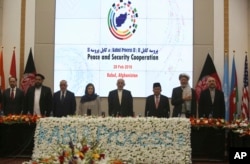Pakistan’s Prime Minister Shahid Khaqan Abbasi is set to pay an official visit to Afghanistan on Friday to discuss strained mutual ties and Kabul’s initiative of seeking a negotiated end to its war with the Taliban.
Officials in Islamabad said Abbasi was undertaking the daylong trip at the invitation of Afghan President Ashraf Ghani “in the backdrop of Pakistan’s support to Ghani’s offer of peace talks with the Taliban."
The two sides also will discuss ways to ease bilateral tensions and strengthen political, economic, security and counterterrorism cooperation.
Ghani offered unconditional talks to the Taliban more than a month ago at an international conference in Kabul to try to end the bloodshed in his country. His initiative received widespread domestic and international backing, but the insurgents have avoided commenting on the overture.
“We stand for peace in Afghanistan,” Abbasi said Thursday at an international counterterrorism conference in Pakistan's capital. He emphasized that instability in the neighboring country directly undermines Pakistan's security.
Abbasi rejected as “a totally flawed narrative” allegations that Pakistan is covertly supporting the Taliban to fuel the Afghan conflict. He said Pakistan's security forces had cleared all their territory of terrorist groups.
A separate Pakistan statement also dismissing the allegations, saying security forces were conducting counterterrorism operations inside their own territory and that details of such activities were shared with Afghan military counterparts beforehand.
“We don’t accept the narrative that there are any sanctuaries in Pakistan, which result in instability in Afghanistan. That is not the truth. Today, unfortunately, the reverse is true. The people instigating terror in Pakistan are based in Afghanistan," the prime minister added at the conference.
Meanwhile Thursday, the Afghan foreign ministry accused Pakistan's air force of violating the country’s airspace and bombing its border areas. The alleged attacks did not cause any casualties, the ministry said.
Kabul also routinely accuses Pakistani security forces of launching cross-border fire on Afghan villages.
Officials in Pakistan maintain militants have taken shelter in “ungoverned spaces” in Afghanistan and plot cross-border attacks from there.
In his speech, Abbasi insisted Pakistan was unilaterally constructing a fence on its largely porous border with Afghanistan to demonstrate Islamabad's resolve to promote peace and security in both countries.
U.S. and Afghan officials have long alleged sanctuaries on Pakistani soil have enabled the Taliban to sustain and expand its violent campaign on the Afghan side.
U.S. President Donald Trump in January suspended military aid to Islamabad until it takes decisive actions against militant safe havens.
The United States has welcomed Islamabad's renewed diplomatic re-engagement with Kabul, saying an improved mutual relationship is essential for regional efforts against terrorism.
"Obviously, for there to be stability in Afghanistan there needs to be a strong relationship between Afghanistan and Pakistan,” Alice Wells, U.S. principal deputy assistant secretary of state for South and Central Asia, said Monday as she wrapped up a weeklong visit to Islamabad.





